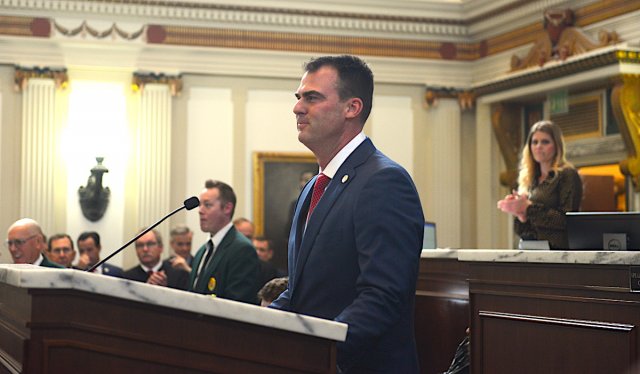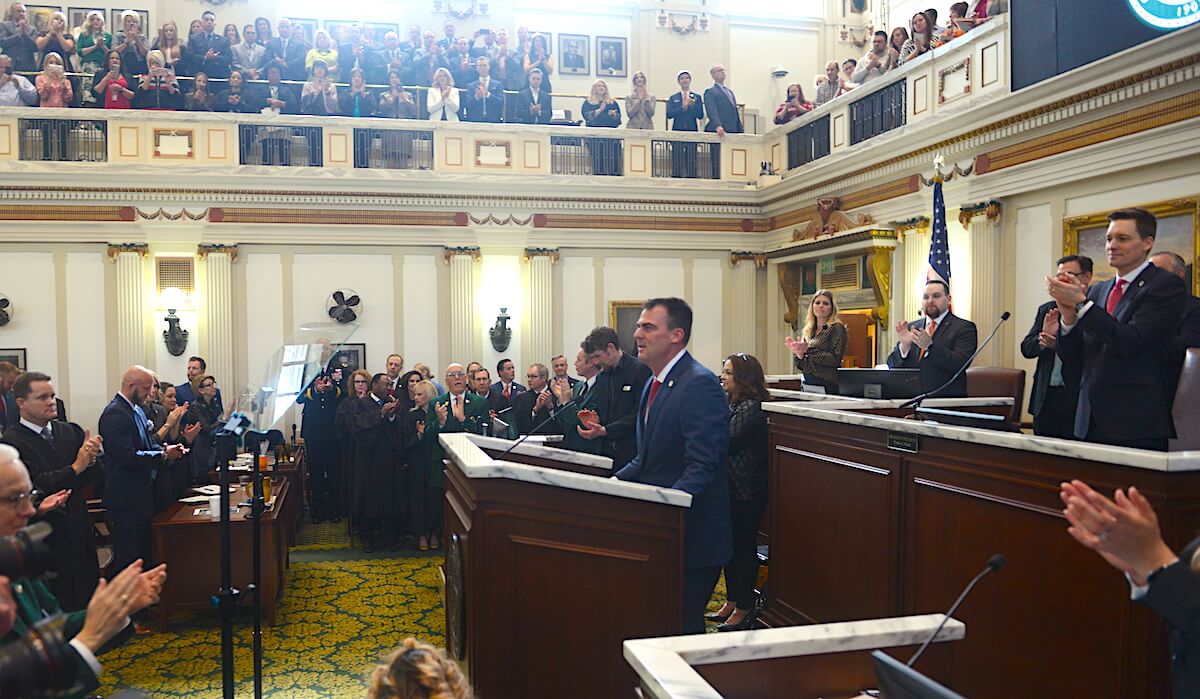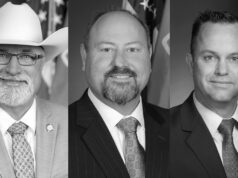

During his second State of the State address, Gov. Kevin Stitt kicked off the 2020 legislative session by calling for a series of agency mergers and asserting that Oklahoma’s “greatest challenge” is “government bureaucracy.”
“Oklahomans, our economy is competitive. And in this administration, we will keep it that way,” Stitt said. “The greatest challenge before us today is government bureaucracy. In my first year of public service and as the chief executive, I have found government too big and too broken.”
Stitt delivered his 4,600-word speech in the House of Representatives chamber starting at 12:30 p.m. Oklahoma’s annual State of the State speech lays out the governor’s priorities on the first day of session, which must conclude by Friday, May 29, this year.
“The state of our state is growing in strength, stability, and new opportunity for generations to come. We are moving in the direction we all want to go: top-10 in the nation,” Stitt said.
Stitt acknowledged that changing governmental structures can be difficult.
“Some will cry that consolidation is disruptive. Let me be clear: It will be for political insiders and those that find comfort in big bureaucracy,” Stitt said. “But it is what we need to do to improve decision-making, deliver better accountability, and target dollars directly towards helping our citizens instead of paying for administrative bloat.”
Stitt said Oklahoma has the 20th highest land mass among states and ranks only 28th in terms of population.
“Yet, we have the ninth-most state agencies out of all 50 states. This is unacceptable,” Stitt said. “There is no value to having more agencies than other states; it has not solved our ‘bottom-10’ rankings in critical categories.”
Compact talk in front of tribal leaders
Currently, Oklahoma is top-10 in the country for disputes with sovereign tribal nations, and toward the end of his address on Monday, Stitt brought up the casino gambling disagreement lingering over Oklahoma’s political landscape.
With Chickasaw Nation Gov. Bill Anoatubby, Cherokee Nation Principal Chief Chuck Hoskin Jr. and other tribal leaders seated in the House gallery, Stitt said “we have an expired Model Gaming Compact.”
“After five offers from the state for all stakeholders to come together to modernize the Model Gaming Compact, three tribes instead sued the state on New Year’s Eve,” Stitt said. “While we wait for the federal court’s decision, I am calling for the Legislature to join me in protecting public education. I am asking for legislation that will allow the remaining cash balance from 2019 and funds from the Revenue Stabilization Fund to be leveraged, if needed, to compensate for any temporary pause in Class III gaming fees.”
Stitt said that, as governor, he remains “supportive of the sovereignty of the state of Oklahoma and our right — and your duty as the Legislature — to oversee all industries operating in the state.”
“I also remain confident the state and Oklahoma’s tribes can hammer out a compromise that is a win-win for all four million Oklahomans, and we can accomplish this without putting public education in the crosshairs,” Stitt said.
Prior to his introduction of Stitt, Lt. Gov. Matt Pinnell recognized statewide elected officials, court members and tribal leaders. Stitt also recognized “tribal leaders” when he began his remarks, but after his speech Hoskin expressed displeasure with Stitt referencing Oklahoma’s sovereignty but not that of the tribes.
“I don’t know that this governor has proven he wants to learn about tribal sovereignty,” Hoskin said. “He is a Cherokee tribal member. If he would listen to his chief, we could get through this. But he needs to understand tribal sovereignty. He needs to understand our role in gaming. He needs to understand that the state of Oklahoma has never had a better friend than the Cherokee Nation and other tribes, but it is a friendship that needs to be based on respect and understanding.”
Stitt’s executive budget a ‘big-picture strategy’

Within Stitt’s address, the governor called for a specific set of proposals he would like to see approved in 2020, which are also outlined in his proposed executive budget released in conjunction with his speech.
By focusing on recurring agency needs, emphasizing a priority for $100 million in savings and only a handful of specific gubernatorial requests, Stitt’s proposed executive budget varies slightly from tradition.
Beyond the specific proposals listed in the next subsection of this story, Stitt’s proposed budget notes a $163 million “remaining balance” intended for legislative discretion, assuming revenue estimates do not change dramatically at the Feb. 18 meeting of the Board of Equalization.
Secretary of Budget Mike Mazzei emphasized the change in executive budget presentation during an embargoed press briefing prior to Stitt’s speech.
“Most governor proposals have said, ‘Here’s all the money, and here’s how we can spend it all.’ This governor is looking at big-picture strategy and how we (pursue) a sustainable path,” Mazzei said. “We want to protect and maintain what was implemented last year and consider possible ideas for additional progress as we collaborate with our legislative partners.”
Senate President Pro Tempore Greg Treat (R-OKC) said Monday afternoon that while he had not fully reviewed the governor’s proposed executive budget, he does appreciate how all sources of agency revenue were included.
“It’s a matter of style. I am excited that this governor’s budget has the totality of funding in it. It gives a much clearer picture,” Treat said. “I think it’s extremely important when we are making decisions that we have the complete picture.”
Specific Stitt proposals for 2020 session
When Mazzei previewed the governor’s executive budget proposal early Monday morning, he distributed a document that listed five “items of critical need” totalling about $25 million:
- $6 million to reduce the Developmental Disability Services waiting list by 10 percent, which the Legislature devoted $10 million of additional appropriations to last year;
- $10 million for the Digital Transformation Fund for government modernization, which the Legislature appropriated an additional $15 million to last session;
- About $1.5 million to reimburse the Department of Public Safety for money spent rolling out REAL ID in April 2020;
- $4.9 million for OSU Medical Authority for residency programs;
- $3 million of state dollars to assist with a new Veterans Administration facility project in northeast Oklahoma supported by $120 million of federal money.
Two other priorities for the Stitt administration ahead of the 2020 election cycle would require statewide votes to change the Oklahoma Constitution.
Monday, his administration proposed raising the cap on the Constitutional Reserve Fund (also known as the Rainy Day Fund) from 15 percent to 30 percent of certified actual collections. One of Stitt’s priorities since taking office has been the achievement of $2 billion in cash reserves.
“Which you know is his goal,” Mazzei told media. “Needless to say, we are very pleased with the $1 billion amount that is set aside in savings, but that’s not even two months worth of expenses. “Most of us in the business world would say you need at least three months (of reserve).”
Stitt’s proposed budget also calls for the Legislature to deposit an additional $100 million into the Revenue Stabilization Fund, which received a $200 million deposit last year.
The other item proposed Monday that would require a statewide vote for constitutional change involves the Oklahoma Tobacco Settlement Endowment Trust, a state agency created in the mid-1990s following the national tobacco settlement. TSET’s fund balance currently sits at about $1.3 billion, with 75 percent of every annual settlement payment being added to the balance.
“TSET is something [the governor] thinks needs to be revised. There is $40-some million that they are distributing (annually),” Mazzei said. “When you look under the hood, however, a good third to 40 percent of that money goes to research.”
Mazzei said Oklahoma already has other mechanisms for research funding and that the administration believes more of TSET’s dollars could be “going toward true health care delivery, more physicians, helping out with SoonerCare 2.0, we are considering a lot of items there that could be more efficient with that bucket of money.”
Other proposals supported by the governor heading into session include:
- $3 million for the Quick Action Closing Fund for business recruitment;
- $2 million for the Oklahoma Brand Relaunch initiative spearheaded by Pinnell;
- Bonding $100 million through the Oklahoma Department of Transportation to “accelerate projects for high-volume urban interchanges”;
- Designating $50 million of existing Department of Transportation cash “to qualify for a low interest $50 million loan” from the federal government’s Transportation Infrastructure Finance and Innovation Act “to accelerate projects to add shoulders and improve rural two-lane highways”;
- Financing $50 million for state agency technology infrastructure improvements;
- a requirement state agencies to remove at least two regulations for every new regulation being written
- an increase in the Oklahoma Equal Opportunity Scholarship Tax Credit cap from $5 million to $30 million;
- an appropriation of $500,000 to join Jobs for American Graduates, a school-to-career program with presence in schools across the U.S. and United Kingdom.
Stitt proposes merging state agencies
In his State of the State address, Stitt called for the consolidation of state services that would affect at least nine state agencies. The proposals include merging:
- the Office of Emergency Management and the Office of Homeland Security;
- the Department of Transportation and the Turnpike Authority;
- the Pardon and Parole Board into the Oklahoma Department of Corrections;
- three health care agencies by 2022: the Oklahoma Health Care Authority, the Oklahoma State Department of Health and the Oklahoma Department of Mental Health and Substance Abuse Services.
“Did you know that Oklahoma has 10 different state agencies passing money through the Medicaid program in Oklahoma? And 18 state entities that license health care facilities and providers?” Stitt quizzed. “You cannot convince me that operating that many bureaucracies is an efficient way of doing business. And it has to change.”
In response to Stitt’s address, House Minority Leader Emily Virgin (D-Norman) said the governor “might be out of touch” considering he focused his speech on government bureaucracy instead of additional funding for public schools.
“Give me more power — that’s what we keep hearing from the governor,” Virgin said, adding that Stitt used “a lot of buzz words” to discuss government bureaucracy.
“I think it’s a lazy way of going about things by using all of these talking points,” she said. “Most of our agencies are still trying to recover from a decade of cuts.”
Senate Minority Leader Kay Floyd (D-OKC) said she supports efforts to make government more efficient but that such proposals need to be robustly considered from many angles.
“I’ve heard that before. I think governors come in and want to streamline government, which is a noble cause when it needs to be done,” Floyd said, specifically addressing the proposed health agency consolidation. “[Health care] is an incredibly complex issue.”
In his speech, Stitt also called for all new state employee hires be “unclassified,” a designation that features fewer benefits for state employees and more flexibility for state agencies.
“When good policy meets the right leadership, anything is possible,” Stitt said.
‘A bump in their pension income’
Retirees from Oklahoma’s public employ sectors such as former teachers, firefighters, law enforcement officers and state workers would like to believe a cost of living adjustment — or COLA — will be possible this year.
In 2019, the House approved a substantial increase in retirees’ monthly pension payments, but the proposal stalled in a State Senate whose leaders called for an actuarial study of the matter.
Asked Monday morning whether a COLA will happen this year, Mazzei said it was possible to be achieved in different ways.
“The governor very much understands that some of our hardworking government retired employees could really use a bump in their pension income,” Mazzei said. “How you do that, we are looking forward to listening to what the Legislature comes up with.”
Mazzei said different pension systems — which have different levels of unfunded liabilities — could see different percentages of COLAs and could be achieved in separate ways.
(Update: This story was updated at 2:13 p.m. Monday, Feb. 3, to include comments from Hoskin and Virgin. It was updated again to include comments from Treat and Floyd and 4 p.m.)
(Correction: This story was updated at 10 p.m. Monday, Feb. 3, to note that Stitt’s proposal to consolidate three health care agencies would have a 2022 targeted date of implementation.)




















